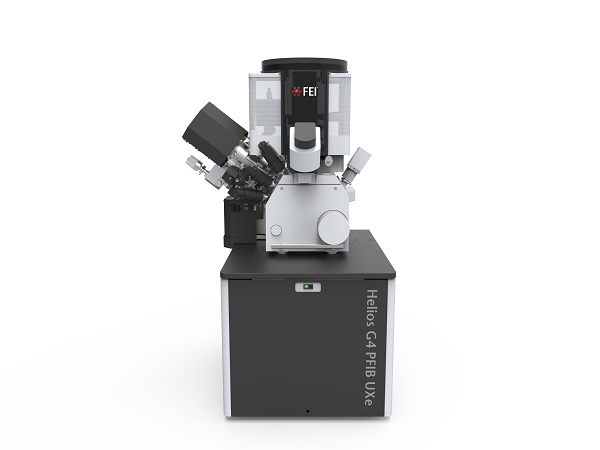Plasma FIB addition to flagship DualBeam can significantly increase milling speed, enabling analyses of larger features that are impractical with conventional FIB technology

The flagship FEI Helios G4 DualBeam Series is now available with plasma focused ion beam (PFIB) technology for advanced materials research. The faster milling capability of the PFIB enables the analysis of a relevant set of features that are too large for conventional gallium (Ga+) FIB. The analysis of larger regions of interest is important to materials scientists working in areas such as metals, batteries, and additive manufacturing.
We pioneered the DualBeam over 20 years ago. Today we are pleased to continue our leadership in DualBeam technology with the launch of the new Helios G4 PFIB, delivering high-throughput FIB processing; high-resolution, large-area two- and three-dimensional imaging; and high-quality TEM sample preparation. The unique combination of PFIB, control electronics, stage flexibility and control, and materials science application expertise provides the performance and support that our customers need to advance their research.
Trisha Rice, vice president and general manager, Materials Science, Thermo Fisher Scientific.
Multiscale imaging and analysis helps researchers link nanoscale information to macro-scale effects in materials. Traditional Ga+ FIB systems have been used to prepare samples for transmission electron microscopy (TEM) and perform cross-sections and 3D analysis, but the size of the features it can analyze is limited by its milling speed. Plasma-based DualBeam systems can remove material significantly faster than Ga+ FIB, increasing analytical throughput and enabling analysis of a relevant volume of features that are too large to section with Ga+ FIB in a practical time frame. The new Helios G4 PFIB is also designed to avoid issues associated with the implantation of Ga + ions in some applications.
The key technologies in the new Helios G4 PFIB include:
- New PFIB 2.0 ion column offers high beam current and an excellent beam profile over the full current range, providing a combination of quality and throughput,
- Industry-leading Elstar electron column with UC+ monochromator for high-resolution imaging,
- An advanced and wide range of gas chemistries,
- Easy-to-use Auto Slice & View and AutoTEM 4.0 software,
- Fast and easy guided TEM sample preparation for novice users, and
- Self-alignment and optimization of system operating parameters.
The Helios G4 PFIB comes in two models: the CXe offers a flexible 110 mm DC stage and the UXe features a high-performance 150 mm piezo stage.